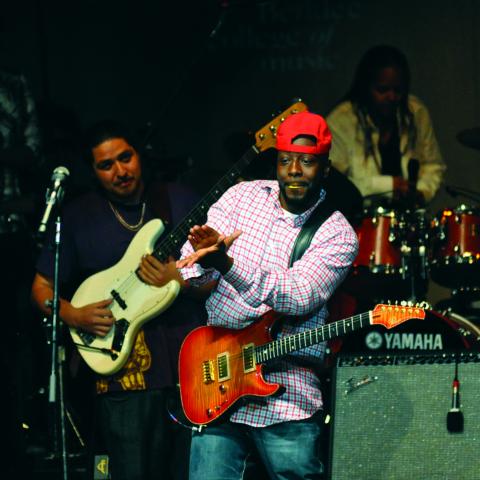Wycleff Hits the Books

Haitian hip-hop star and producer Wyclef Jean (center) is a Berklee Student.
Phil Farnsworth
Amid a successful career as a Grammy-winning producer, chart-topping rap artist, film composer, and philanthropist, Wyclef Jean has now become a Berklee student. During the closing weeks of the fall semester, Jean visited Berklee and answered a few questions about his experience on campus.
How have you found the time to come to Berklee?
Whenever you have a determination and it's something you really want to do, I think you'll find the time for it.
Because of my crazy schedule, we had to figure out how to carve out the time. Right now it's online classes, and a few classes here at Berklee with two teachers. We're hoping that next semester I can physically be here a little more. I prefer being in the presence of the teachers.
What stands out among the things you've learned?
I just learned that a C scale is not just a C scale. Now I can see all the modes so that one scale looks like seven. Of course, I've been using these scales all my life, but I didn't know what they were. Now I understand the theory of why I was doing it, and that makes me more dangerous. The teachers have been finding out they can show me one or two things and it sparks a whole other library in my head. When I'm working with Santana, there's a group of scales he likes to use, when I'm scoring a film - say it's a horror film - there are scales I can use that make it sound a certain way.
During you career, would more education have helped you in certain instances?
The first movie I scored was Life, with Eddie Murphy and Martin Lawrence. The director, Ted Demme, said, "Clef, in this scene here, we need a certain emotion to make people feel like they're gonna cry."
When he said that, I was like, "Oof . . . if I only took theory, . . . there's probably a 'cry' scale, and I could just grab it." I still did what I had to do, but I wished that I'd had that information.
What other Berklee courses interest you?
I walked into a producers' class today, and I was fascinated by the way the teacher was giving them these records, and [the students] had to produce the entire record from scratch. Their ears would be tested from beginning to end. To me, that class had the pulse, because this is how the industry changes. Music changes every three weeks, and you've got to have that ear to be able to adapt to any sound.
I was also highly impressed by the studio equipment, because I'm a studio buff. It was to the point where I started thinking it might be really cool if I mixed some of my next album at Berklee and give kids a shot at mixing it. How crazy would it be for a kid to be on a Wyclef album and get engineering credit?
Also, I haven't laid the string sections yet on my album. What if the chart was written by a student from Berklee? This is the kind of stuff that excites me about being here.
A lot of great musicians have used Berklee for a stakeout. They come, grab great students, and leave. Then the students don't finish their four years here. I was thinking, 'What if I have students participate in what I do as a whole as opposed to trying to [lure a student away]?' I feel like I could leave a great legacy at Berklee. I think it would be cool to record here - really record - so when an artist looks at the credit, it's some engineer who goes to Berklee [who] made the mix.
What's the best part of being a student again?
It feels like being a kid in a candy store for me. The students should get as much as they can out of [this]; don't take it for granted. Study as much as y'all can.
Will returning to college suggest new things you'd like to do with the Yelé Haiti HELP college scholarship program?
Oh, definitely. I'm building a studio in the slums of Haiti. It would be great for some Berklee students to go down there one summer and work with some of the kids.
Adam Renn Olenn is the website producer in Berklee's Office of Institutional Advancement.



